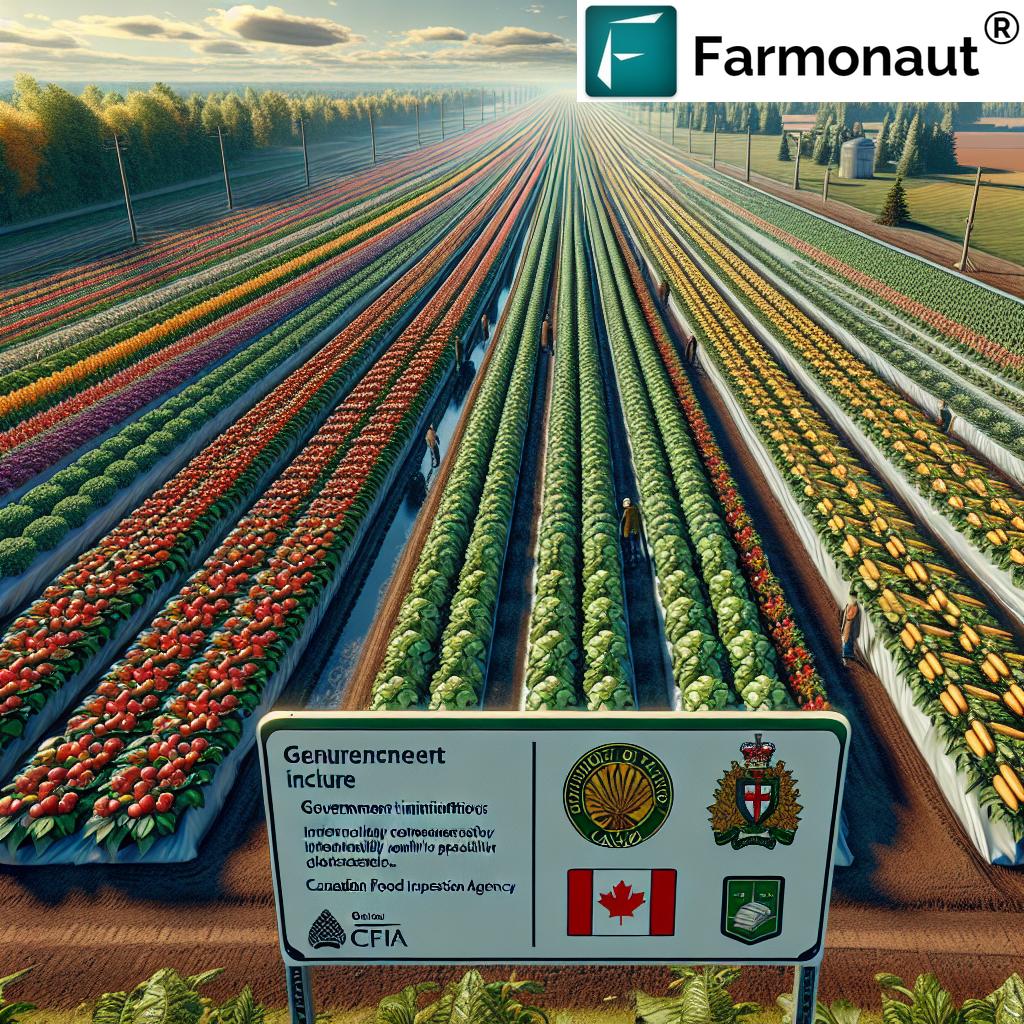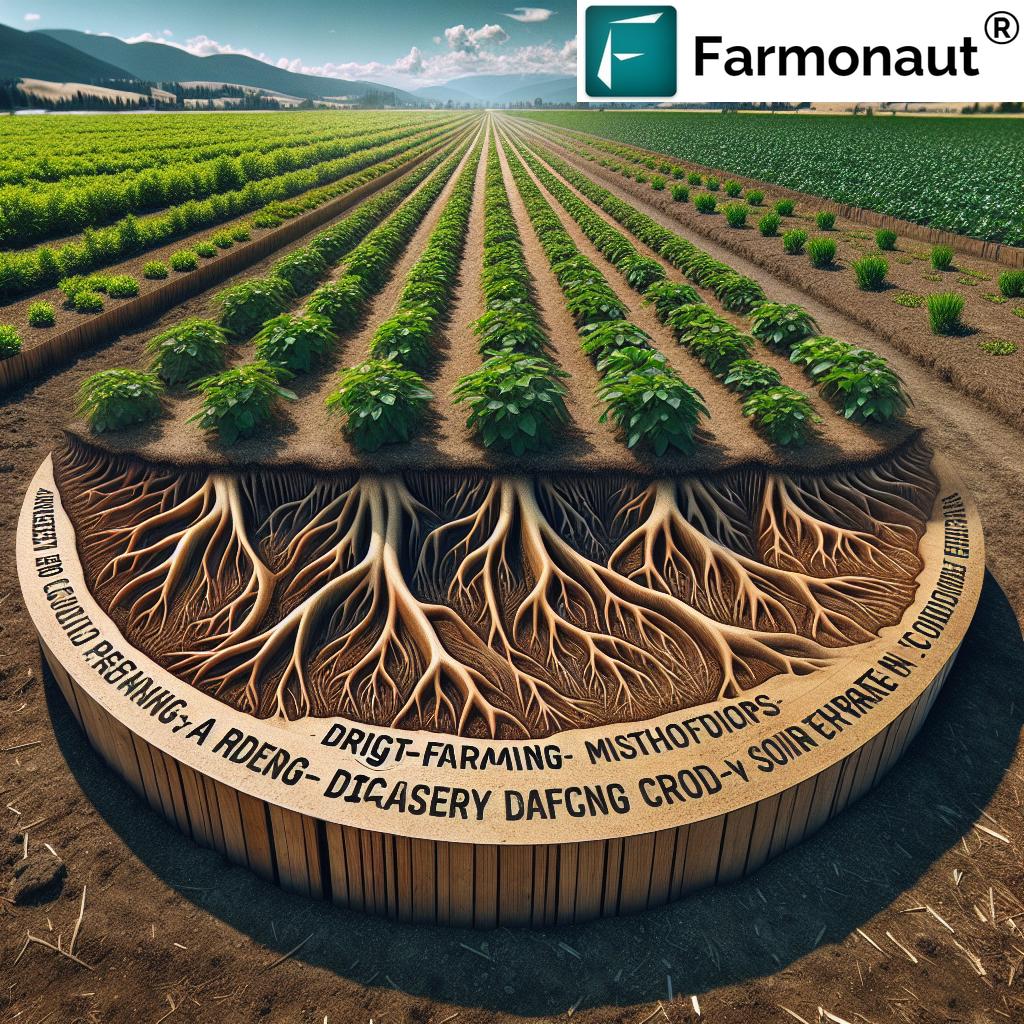Canada Philippines Defense Pact: 5 Key Security Moves
“Canada and the Philippines signed 5 major security agreements in 2024 to boost bilateral defense cooperation.”
Table of Contents
- Introduction
- Background: Canada-Philippines Bilateral Relations
- Key Security Move 1: Status of Visiting Forces Agreement (SoVFA)
- Key Security Move 2: Joint Military Exercises in South China Sea
- Key Security Move 3: Indo-Pacific Agriculture and Agri-Food Office in Manila
- Key Security Move 4: Agricultural Partnerships Supporting Indigenous Communities
- Key Security Move 5: Collaborative Economic Development Initiatives
- Comparative Impact Table: Canada-Philippines Defense Pact
- Farmonaut: Advanced Technologies Supporting Agricultural Cooperation in Asia
- Frequently Asked Questions
- Conclusion
Introduction
The strengthening of philippines canada bilateral relations represents a significant shift in the Asia-Pacific’s security, agricultural, and economic landscape. As global attention focuses on regional challenges and opportunities, both Canada and the Philippines are proactively enhancing cooperation in key areas. Highlighted by the planned Status of Visiting Forces Agreement (SoVFA) and a suite of security and agricultural collaborations, these efforts aim not only to bolster mutual defense but also to deepen economic and industry partnerships. This comprehensive analysis explores five pivotal security and agricultural moves under the evolving Canada Philippines Defense Pact, showcasing their impact on regional security, economic development, and agricultural cooperation in Asia.
Background: Canada-Philippines Bilateral Relations and Regional Context
In the current era of geopolitical shifts and evolving economic priorities, philippines canada bilateral relations have taken center stage in both regional and international discourse. These nations are deepening their ties through both defense partnerships—to safeguard common interests in areas like the South China Sea—and initiatives that catalyze agricultural cooperation in Asia.
Canada recognizes the Philippines as a crucial partner in Southeast Asia, given the latter’s strategic location and rapidly growing economy. As both nations look to diversify allies and trade relationships in response to china‘s regional assertiveness, increased collaboration ensures a more resilient approach to shared challenges. This multifaceted partnership includes:
- Joint security initiatives and military agreements
- Agricultural trade and food security efforts
- Supporting indigenous communities philippines through sustainable agriculture
- Mutual enhancement of economic and industry opportunities
“Bilateral agricultural trade between Canada and the Philippines surpassed $1 billion, strengthening regional economic ties in 2023.”
Key Security Move 1: Status of Visiting Forces Agreement (SoVFA) – A Transformative Framework
One of the most anticipated developments in canada philippine bilateral relations is the conclusion of the Status of Visiting Forces Agreement (SoVFA) between Canada and the Philippines. This agreement delivers the crucial legal framework and protocols for foreign military personnel to operate within each other’s territories, thus enabling seamless cooperation, training, and joint military exercises.
Understanding the SoVFA: Legal and Operational Provisions
- Legal Foundation: The SoVFA outlines the terms for the treatment and conduct of visiting military personnel and provides mechanisms for resolving disputes and coordinating activities.
- Immunity Provisions: The agreement grants immunity from criminal and civil liability for visiting troops when performing official duties. This mirrors similar provisions for filipino soldiers stationed in Canada.
- Enabling Joint Training and Operations: The SoVFA serves as a foundation for enhanced joint military exercises and large-scale operations, particularly in the strategic South China Sea.
- Strategic Signal: The agreement signifies a commitment to long-term defense and security collaboration, sending a powerful signal to other regional players, including china.
With the SoVFA in place, both nations can conduct regular and robust joint military drills—enhancing interoperability between armed forces and increasing effectiveness in areas such as disaster response and maritime security.
Focus Keyword: Status of Visiting Forces Agreement in Bilateral Defense Partnerships
This key security move reflects a global trend where countries seek reciprocal access agreements and legal frameworks to facilitate coalition-building and collective security. Similar agreements have been pursued by the Philippines with Japan, New Zealand, and France, aimed at strengthening defense ties and bolstering maritime security in Southeast Asia.
Key Security Move 2: Joint Military Exercises in the South China Sea
With geopolitical tensions simmering in the South China Sea, joint military exercises between Canada and the Philippines are poised to play a pivotal role. The upcoming SoVFA will empower both nations to conduct coordinated training, strengthen operational readiness, and improve collective responses to security threats.
Strategic Impact of Joint Military Exercises in South China Sea
- Enhances regional security and demonstrates collective resilience against china‘s assertive actions
- Provides hands-on, real-world experience for soldiers in transnational threat scenarios
- Supports strategic deterrence and upholds freedom of navigation in vital maritime routes
A consistent schedule of joint drills cements operational synergy between the two armed forces. These initiatives directly contribute to the overarching goal of maintaining stability and peace in the region—benefiting not just the Philippines and Canada, but all countries reliant on the maritime trade corridor.
Comparative Impact Table: Canada-Philippines Defense Pact – Five Key Initiatives
| Initiative | Main Objective | Estimated Regional Benefit | Sector Involved | Implementation Timeline |
|---|---|---|---|---|
| Status of Visiting Forces Agreement (SoVFA) | Establish legal framework for military operations and immunity provisions | Enhanced interoperability, operational readiness, regional security | Defense | 2025–2026 |
| Joint Military Exercises in South China Sea | Strengthen military cooperation, deterrence, and regional stability | Improved maritime safety, deterrence of assertive activities | Defense | 2025–2027 (ongoing) |
| Opening of Indo-Pacific Agriculture and Agri-Food Office in Manila | Serve as a hub for trade, partnerships, and food security solutions | Growth in agricultural trade, expanded export markets | Agriculture/Economic | 2024–2026 |
| Distribution of Canadian Seed Potatoes to Indigenous Communities | Direct support for indigenous farmers and productivity increase | Enhanced food security and agricultural productivity | Agriculture/Social Welfare | 2023–2025 |
| Collaborative Economic Development Initiatives | Expand bilateral trade and promote sustainable sector growth | Regional economic growth, sustainable food systems | Agriculture/Economic | 2024–2027 |
Key Security Move 3: Indo-Pacific Agriculture and Agri-Food Office in Manila – Promoting Agricultural Trade in Asia
A defining moment in the canada philippines defense pact narrative was the 2024 inauguration of Canada’s Indo-Pacific Agriculture and Agri-Food Office in Manila. This strategic hub signals Canada’s commitment to strengthening agricultural cooperation, boosting agricultural trade, and facilitating region-wide economic development.
Role and Impact of the Manila Agri-Food Office
- Market Access: Streamlines processes for Canadian agriculture products to access Southeast Asian markets, encouraging export-driven growth and integration.
- Trade Promotion: Acts as a launchpad for promoting agricultural trade in Asia, fostering partnerships, and addressing food security and sustainability challenges.
- Innovation Hub: Facilitates knowledge exchange and capacity-building on food safety, sustainability, and resource management.
By fortifying trade partnerships and supporting knowledge sharing, this Manila office is not only expanding export markets for agriculture but also catalyzing sector-wide advancements and economic diversification in the Philippine agricultural industry.
Enhance transparency and consumer trust by tracking agricultural products from farm to fork. Learn more about Farmonaut Product Traceability.
Key Security Move 4: Supporting Indigenous Communities – Distribution of Canadian Seed Potatoes
In a pioneering partnership, an NGO facilitated the purchase of granola seed potatoes from Prince Edward Island, Canada, which were then distributed to at least five indigenous communities in the Philippines. This initiative exemplifies the power of agricultural cooperation in uplifting marginalized farmers and supporting sustainable community development.
Benefits of Seed Potato Distribution to Indigenous Communities
- Enhancing Food Security: By providing high-quality seed potatoes, local farmers in remote and Indigenous areas significantly increased potato productivity.
- Sustainable Growth: Transfers agricultural knowledge and innovation, fostering resilience and long-term community sustainability.
- Supporting Indigenous Communities Philippines: Directly aligns with the SDGs on zero hunger and inclusive economic opportunity.
Such collaborations go beyond trade—they create tangible on-the-ground improvements, showcasing how agricultural initiatives can transform lives and foster resilient, food-secure communities.
Key Security Move 5: Collaborative Economic Development Initiatives for Southeast Asia
The broader Canada Philippines Defense Pact is underpinned by efforts to drive economic development partnerships in Southeast Asia. Diverse sector-wide collaborations—ranging from trade frameworks and export facilitation to technical support for sustainable agriculture—form the backbone of this vision.
Strategies for Economic Development and Agricultural Cooperation
- Bilateral Trade Expansion: Ongoing efforts focus on increasing the value and diversity of traded goods, especially in the agricultural and processed food sectors.
- Export Market Access: Lowering barriers to canadian agricultural products in the philippine market and vice versa, promoting growth and price stability.
- Sustainability and Innovation: Encourages sustainable farming techniques, fosters food security, and supports adoption of modern management tools.
This initiative addresses regional economic resilience and aligns with policy efforts to strengthen partnerships and enhance cooperation with other Asia-Pacific economies.
Get actionable insights on emissions and sustainability with advanced carbon accounting tools. Learn more about Farmonaut Carbon Footprinting.
Farmonaut: Advanced Technologies Supporting Agricultural Cooperation in Asia
Precision agriculture and technology-driven resource management are revolutionizing how agricultural cooperation in Asia unfolds. At Farmonaut, we are committed to empowering the global farming community—including those in the Philippines—by delivering real-time crop monitoring, AI-driven advisory, and blockchain traceability.
- Satellite Crop Health Monitoring: Our platform provides vegetation health indices, soil moisture, and management tools to drive yield improvement and reduce resource wastage.
- AI Farm Advisory: Jeevn AI helps farmers anticipate weather and manage crops efficiently, ensuring productivity gains under diverse field conditions.
- Blockchain-Based Traceability: Transparency in supply chains is critical for building trust and securing markets—solutions valued by exporters and regulators alike.
- Resource & Fleet Management: We help agribusinesses in the philippines and beyond optimize logistics, reduce cost, and ensure safe operation of agricultural equipment. Discover Fleet Management Tools
- Environmental Sustainability: With carbon tracking, our platform supports compliance with global sustainability standards.
Our flexible subscription model scales with farm size and user needs. Explore our latest features directly through our mobile apps or web portal. API integration is available for organizations seeking to embed satellite or weather data directly into their in-house systems.
Explore our advanced satellite and AI solutions today:
- Farmonaut API: Direct access to geospatial data for developers & enterprises
- Developer Docs: Integration guides for technical teams.
- Large Scale Farm Management: Enterprise-grade tools for agribusinesses and collectives.
- Crop Loan and Insurance: Enhance access to finance through satellite verification.
Frequently Asked Questions (FAQ): Canada Philippines Defense Pact & Agricultural Cooperation
1. What is the Status of Visiting Forces Agreement (SoVFA) between Canada and the Philippines?
The SoVFA is a legal framework that enables Canadian and Filipino soldiers to conduct joint training, military exercises, and other official activities within each other’s territories. It defines protocols on treatment, conduct, and provides immunity for official duties, enhancing both security and operational effectiveness.
2. How does the Canada-Philippines partnership support agricultural development in Asia?
Through trade offices, direct support programs (like seed potato distribution), and expanded market initiatives, the partnership boosts food security, bolsters the Philippine agri-sector, and creates opportunities for shared growth across Southeast Asia.
3. What is the strategic importance of joint military exercises in the South China Sea?
Such drills strengthen regional security, reinforce freedom of navigation, build operational interoperability, and serve as a deterrent against assertive actions by state and non-state actors, particularly in contested waters.
4. How do Canada and the Philippines support indigenous communities through agricultural cooperation?
Initiatives like the distribution of high-yield Canadian seed potatoes to indigenous groups have dramatically improved agricultural productivity and food security in marginalized Philippine communities, aligning with broader inclusion and development goals.
5. Where can I find precision farming and satellite analytics solutions to support my farm?
You can access real-time crop health monitoring, AI advisory, and blockchain traceability tools on Farmonaut’s platform. Available via web, Android, and iOS, or integrate via our open API.
Conclusion: The Future of Canada-Philippines Security & Agricultural Cooperation
The evolution of the Canada Philippines Defense Pact through five major security and agricultural moves sets a precedent for regional cooperation worldwide. The anticipated signing of the SoVFA, robust joint military exercises in the South China Sea, and groundbreaking initiatives such as the Indo-Pacific Agri-Food Office and support for indigenous communities collectively ensure that both nations remain at the forefront of strategic, technological, and economic progress.
By fostering deeper ties, expanding access to resources and markets, and making a tangible difference on the ground for both large-scale agribusiness and smallholder farmers, these initiatives promise comprehensive, sustainable growth. As industry trends point to increased integration and digital transformation in agricultural and defense sectors, the philippines canada bilateral relations will likely serve as a model for dynamic, responsible partnership in the 21st century.
For those seeking to innovate or optimize in the landscape of modern agriculture, solutions like Farmonaut offer powerful, accessible ways to leverage remote sensing, data analytics, and AI. As new defense and economic opportunities emerge, leveraging the right technologies will be key to staying resilient and competitive in the global marketplace.
Download the Farmonaut App or explore our suite of solutions to join the next generation of agricultural development and food security innovation.
















